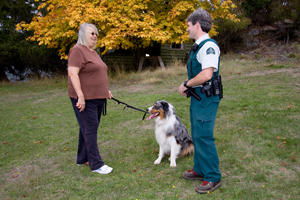Leave No Trace™
Gulf Islands National Park Reserve
Good times in the great outdoors are safer and more rewarding when you Leave No Trace™ of your visit. A good rule of thumb is to leave “no trace on the place” and “no trace on others’ space.”
Don’t just do it...plan it first
It’s safer and more fun when you:
- Choose activities that match your skills and your groups’ expectations.
- Check Important Bulletins.
- Take the right stuff with you.
- Check weather forecasts and sea conditions.
- Take responsibility for your own safety and the safety of your group.
- Are familiar with National Park Regulations.
Stick to durable surfaces
Natural areas can be sensitive to human use. Eroded soil can take years to rebuild. Nesting birds suffer from human interruptions. And it’s just plain wrong to step on species at risk even if they are just plants. Do the right thing and:
- Stay on designated trails.
- Camp only in designated areas and use the tent pads provided.
- Respect closures for Special Preservation Areas. Stay at least 100 metres from islets.
- Bike on roads. Cycling on park trails or deactivated roads is prohibited.
Leave what you find and take what you bring
Every item removed or introduced harms the natural and cultural integrity of the national park. Outdoorsy types know to:
- Leave natural and cultural objects such as flowers, plants, antlers, rocks, shells, driftwood, bricks and other artefacts undisturbed for others to discover and enjoy.
- Pack out all garbage including dog droppings. There are no garbage facilities on the islands.
Be considerate of others
Everyone has the right to relax and enjoy the park in peace. Remember to:
- Consume alcohol only at your campsite or in a properly equipped, moored vessel.
- Respect quiet hours in campgrounds from 10 pm to 8 am.
- Respect no-wake zones in moorage areas.
Be careful with fire
You may not realise it, but it’s dry here in the summer. Fires are prohibited everywhere in the park, including beaches and below the high tide mark. The only exception is in the fire rings provided in the drive-in campgrounds. Please:
- Do not collect deadwood, bark or branches from the forest.
- Use a gas stove for cooking.
- Watch for fire bans.
Wild animals live here

Steller Sea Lions
© Parks Canada / Christian J. Stewart
Spotting wildlife is part of the fun, but only if you give wild critters space and don’t endanger their lives or drain vital energy that could be used for survival.
- Store your food and garbage where wildlife can’t get at it. Learn more about keeping a bare campsite.
- Admire wild animals from a distance. Leave plenty of space to animals that may seem to be in distress, especially seal pups. Attempting to assist them often harms them.
- Take special care on shorelines, wetlands and intertidal area – these are critical habitats for birds and other marine creatures.
- Respect Marine Wildlife Viewing Guidelines.
- Watch for signs of disturbance or stress. You are probably too close if the animal stops feeding, leaves the area or changes its behaviour.
 Keep your dog on a leash at all times
Keep your dog on a leash at all times © Parks Canada / Christian J. Stewart
Manage your four-legged companion
Others may not appreciate Fido. Unleashed dogs can damage sensitive plants, harass wildlife or disturb cultural items. Even a dog’s scent can stress the wild critters.
- Keep your pet leashed at all times.
- Take with you anything left behind by your dog.
- Date modified :